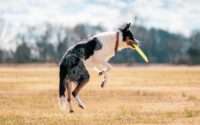What Do Dogs Dream About When They Cry? A Deep Look into the Canine Mind
Dogs are more than just pets—they’re family members who bring joy, companionship, and endless love to our lives. As pet owners, we want to ensure that our furry friends are happy, healthy, and well-cared for. That’s why it’s essential to pay attention to their sleeping habits and understand what they dream about.
Have you ever noticed your dog crying in their sleep? While it may seem concerning, it’s actually a common occurrence. But what do dogs dream about when they cry? That is precisely what we shall delve into in this article.
Understanding Dog Sleep Patterns

Dogs, like humans, go through different sleep stages throughout the night. The most important stage for dreaming is known as REM sleep, which stands for “rapid eye movement.” During REM sleep, dogs’ brains become highly active, and they may twitch or move their legs as if they’re running.
While dogs experience REM sleep similarly to humans, they cycle through this stage more frequently. Puppies, for example, spend up to 80% of their sleep time in REM sleep. This is because REM sleep is essential for cognitive development and memory consolidation in dogs.
Understanding your dog’s sleep patterns is crucial for recognizing when they may be experiencing a sleep disturbance or nightmare. It’s also important to provide them with a comfortable sleeping environment to ensure they get the restful sleep they need to stay happy and healthy.
Why Do Dogs Cry in Their Sleep?
It’s not uncommon for dogs to cry or whimper in their sleep. This behavior is usually an indication that they are dreaming. Dogs’ dreams can trigger emotional responses, just like humans, and cause them to cry out in fear, anxiety, pain, or joy.
The reasons why dogs cry in their sleep may vary from one dog to another. Some dogs may be more prone to experiencing nightmares or have a history of anxiety, which can cause them to have more emotional dreams. Similarly, dogs that have experienced trauma may be more likely to cry in their sleep due to their emotional distress.
Regardless of the reason, it’s essential to pay attention to your dog’s crying and monitor their behavior to ensure they are not experiencing any distress during their dreams.
What Do Dogs Dream About When They Bark?
Just as dogs may cry or whimper in their sleep, they may also bark or growl while dreaming. This behavior can be a cause of concern for some pet owners, but it’s important to remember that it’s entirely normal for dogs to vocalize in their sleep.
So, what do dogs dream about when they bark? As with crying, it’s difficult to know for certain what’s going on in a dog’s dream. However, it’s believed that barking in a dream may be a reflection of a dog’s instincts and past experiences.
For example, a dog may bark in their sleep if they are dreaming about a past experience where they felt threatened or had to protect their owner. Alternatively, a dog may bark in a dream simply because they are excited or playing.
It’s important to note that excessive barking while awake is a behavior that requires training and management. However, barking in a dream is typically nothing to worry about and is just another fascinating aspect of a dog’s sleep cycle.
What Do Dogs Dream About?
Although we can’t know for sure what dogs dream about, research suggests that their dreams are similar to humans’. Dogs may dream about past experiences, such as playing with their favorite toy or going for a walk with their owner. They may also dream about chasing animals or running freely in an open field.
Some experts believe that dogs’ breed and personality may also affect the content of their dreams. For example, hunting breeds may be more likely to dream about chasing prey, while social breeds may dream about interacting with other dogs or humans.
Despite not being able to know precisely what dogs dream about, it’s clear that dreaming is essential for their mental and emotional health. It’s crucial to provide them with a supportive and comfortable sleeping environment to ensure they can experience deep and restful sleep.
The Importance of Dog Dreams
Dreaming is a vital part of dogs’ mental and emotional well-being. During sleep, dogs process and consolidate memories, learn new skills, and develop problem-solving abilities. Dreams also allow dogs to process and cope with emotional experiences, helping them to stay mentally healthy.
Research has shown that depriving dogs of REM sleep can have adverse effects on their cognitive abilities and overall health. It’s essential to ensure that your dog is getting the restful and uninterrupted sleep they need to experience deep REM sleep and dream.
Tips for Supporting Your Dog’s Dreams
As a pet owner, there are several things you can do to support your dog’s dreams and ensure they get the restful sleep they need. Here are some tips:
- Provide a comfortable sleeping environment: Dogs need a comfortable, quiet, and safe sleeping environment to rest properly. Consider providing your dog with a cozy bed, away from any noise or distractions.
- Create a routine: Establish a bedtime routine for your dog, including a set bedtime and calming activities such as a relaxing massage or music.
- Exercise regularly: Regular exercise helps dogs sleep better and reduces stress and anxiety, which can interfere with their dreams.
- Limit disturbances: Avoid waking your dog during REM sleep, as this can interrupt their dreams and cause them to be irritable or groggy.
By following these tips, you can ensure that your dog gets the restful and uninterrupted sleep they need to dream and stay mentally healthy. Remember, paying attention to your dog’s sleeping habits and behavior is crucial to understanding their dreams and ensuring their well-being.
Conclusion
Our canine companions are more than just animals that we keep as pets – they are an integral part of our family, providing us with unconditional love, happiness, and companionship. Recognizing their sleeping habits and dreams is pivotal to their mental and emotional wellness.
Although we cannot be entirely certain about what dogs dream of, it is evident that dreaming plays a fundamental role in their cognitive and emotional growth. By providing our furry friends with a comfortable sleeping environment, creating a bedtime routine, exercising regularly, and limiting disturbances during sleep, we can support their dreams and ensure they get the restful sleep they need.
Paying attention to their sleeping habits and behavior is essential to understanding their dreams and ensuring their overall health and happiness. As caretakers of our beloved pets, it is our responsibility to attend to their physical and emotional needs. This ensures that our furry companions live a life filled with joy, good health, and satisfaction.
Frequently Asked Questions
Q: Why do dogs cry in their sleep?
A: Dogs may cry in their sleep due to a variety of reasons, including nightmares, anxiety, pain, or joy. The reasons may vary from one dog to another.
Q: Do dogs dream like humans?
A: Yes, dogs experience dreams just like humans. According to the National Sleep Foundation, dogs spend about half their day sleeping, and they may dream during this time.
Q: Can dogs have nightmares?
A: Yes, dogs can have nightmares just like humans. Some dogs may be more prone to experiencing nightmares, especially if they have a history of anxiety or trauma.
Q: What should I do if my dog cries in their sleep?
A: If your dog cries in their sleep, it may be a sign that they are experiencing discomfort or distress. You may want to monitor their behavior and consult with a veterinarian if the crying persists or is accompanied by other symptoms.
Q: How can I tell if my dog is dreaming?
A: You may be able to tell if your dog is dreaming by observing their behavior while they sleep. Dogs may twitch, move their legs, or make noises while they dream. Rapid eye movement (REM) is also a sign that your dog may be dreaming.
Q: What do dogs dream about?
A: It is not entirely clear what dogs dream about, but it is believed that they may dream about past experiences, such as playing or going for a walk. They may also dream about things they have seen or heard.
Q: Can dogs have good dreams?
A: Yes, dogs can have good dreams just like humans. They may dream about positive experiences, such as playing or receiving affection from their owners.
Q: Do all dogs dream?
A: It is believed that most dogs do dream, but the frequency and content of their dreams may vary from one dog to another.
Q: Can dogs have nightmares about past traumas?
A: Yes, dogs may have nightmares about past traumas, such as abuse or neglect. If your dog has a history of trauma, it is important to provide them with a safe and secure environment to help them feel more comfortable and secure.
Q: Should I wake my dog up if they are having a nightmare?
A: It is generally not recommended to wake up a dog if they are having a nightmare. Instead, you can gently comfort them and provide reassurance once they wake up.




